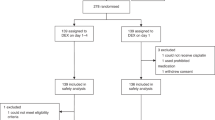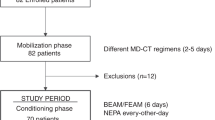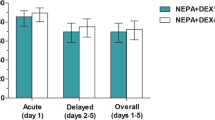Abstract
The anti-emetic efficacy and safety of granisetron, a highly selective and potent 5-HT3 receptor antagonist, was compared with that of high-dose metoclopramide plus dexamethasone in 281 patients due to receive single-day cisplatin chemotherapy (> or = 49 mg m-2). In this single-blind, multicentre study, granisetron (40 micrograms kg-1) was administered as a single prophylactic 5-min infusion. Dexamethasone (12 mg) was administered as a 30-min infusion followed by a loading dose of 3 mg kg-1 metoclopramide. A maintenance dose of metoclopramide 4 mg kg-1 was then infused over 8 h. A single prophylactic dose of granisetron was as effective as the combination regimen in the prevention of cisplatin-induced emesis. Of 143 granisetron-treated patients, 100 (70%) were complete responders (no vomiting and no or only mild nausea) compared with 93/138 (67%) patients who received the comparator regimen. Twenty-three percent of granisetron-treated patients experienced one of more adverse events compared with 33% of patients in the comparator group. No extrapyramidal reactions were reported in the granisetron group compared with 13 in comparator-treated patients (8%). This difference was significant (P < 0.05). The commonest adverse event in the granisetron group, headache (9.8%) described by the majority of patients as mild, was significantly higher than that reported in the comparator group (3% P = 0.02). Granisetron appears to be a safe and effective agent which can be used as a single agent for the prophylaxis of cisplatin-induced emesis. The simplicity of administration, a single 5-min infusion prior to chemotherapy, and the lack of somnolence or extrapyramidal reactions offer clear advantages over the comparator combination regimen.
This is a preview of subscription content, access via your institution
Access options
Subscribe to this journal
Receive 24 print issues and online access
$259.00 per year
only $10.79 per issue
Buy this article
- Purchase on Springer Link
- Instant access to full article PDF
Prices may be subject to local taxes which are calculated during checkout
Similar content being viewed by others
Author information
Authors and Affiliations
Rights and permissions
About this article
Cite this article
Chevallier, B. The control of acute cisplatin-induced emesis – a comparative study of granisetron and a combination regimen of high-dose metoclopramide and dexamethasone. Br J Cancer 68, 176–180 (1993). https://doi.org/10.1038/bjc.1993.309
Issue Date:
DOI: https://doi.org/10.1038/bjc.1993.309
This article is cited by
-
Effects of Korean red ginseng extract on cisplatin-induced nausea and vomiting
Archives of Pharmacal Research (2005)
-
Dexamethasone improves the efficacy of granisetron in the first 24 h following high-dose cisplatin chemotherapy
Supportive Care in Cancer (1995)
-
Granisetron (Kytril): a survey of use in clinical practice in Switzerland
Supportive Care in Cancer (1995)
-
Treatment of chemotherapy-induced emesis in the 1990s: impact of the 5-HT3 receptor antagonists
Supportive Care in Cancer (1994)



